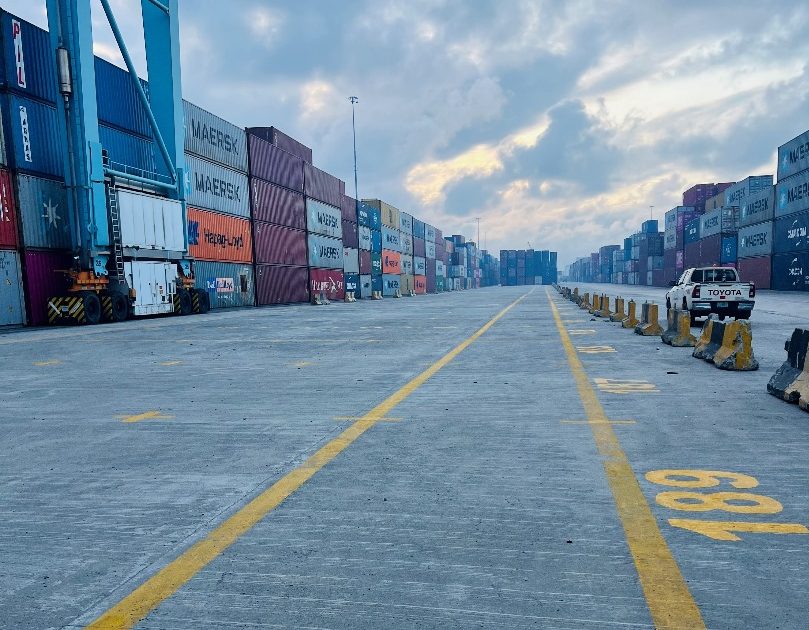The Sea Empowerment and Research Centre (SEREC) has issued a strong recommendation to APM Terminals Apapa, a prominent terminal operator in Nigeria, urging them to temporarily halt the acceptance of empty containers until the current backlog is cleared. This call to action aims to alleviate the persistent congestion plaguing the terminal and streamline shipping operations within the Nigerian maritime sector. SEREC’s report, “Sea Empowerment Research Centre Proffers Workable Solutions to the Logjam Between Terminal Operators and Shipping Lines in the Nigerian Shipping Space,” outlines both short-term and long-term strategies to address the bottleneck at APMT Apapa and enhance the efficiency of shipping activities across the country.
In the short term, SEREC advocates for a two-pronged approach: prioritizing the efficient discharge of incoming laden containers and collaborating closely with shipping lines to expedite the evacuation of empty containers. The immediate suspension of empty container intake is deemed critical to prevent further exacerbation of the existing congestion. Furthermore, maintaining transparent communication with all stakeholders, including landside customers, truck operators, and other relevant parties, regarding the progress of backlog clearance, is essential to ensure a coordinated and effective response.
Looking ahead, SEREC proposes several long-term solutions to address the root causes of the congestion. Firstly, fostering stronger partnerships with shipping lines to improve evacuation rates and ensure regular departures for empty containers is crucial. This collaborative effort should be complemented by the implementation of robust tracking systems to monitor empty container movement, potentially coupled with increased storage capacity or enhanced handling equipment to efficiently manage container volumes. Strengthening inter-industry collaboration and establishing clear policies for empty container management will further optimize the process and prevent the accumulation of abandoned containers.
Beyond addressing the immediate congestion issue, SEREC also tackles the recurring problem of container deposit refunds. Importers and their agents often face delays or outright denial of refunds for container deposits paid to shipping lines. To rectify this, SEREC recommends establishing stringent regulations and guidelines for shipping lines, coupled with penalties for non-compliance. Developing industry-wide standards for deposit refund processes would ensure consistency and fairness, while automated systems could facilitate prompt refunds. Open dialogue with shipping lines to understand their challenges and joint problem-solving are also encouraged. Involving shippers and freight forwarders in developing these processes and ensuring clear communication regarding timelines and procedures are essential for transparency and accountability. Exploring alternative deposit schemes, such as insurance covers or collective funds, could further alleviate the financial burden on shippers and freight forwarders.
SEREC’s comprehensive recommendations encompass both immediate and long-term strategies to address the multifaceted challenges facing the Nigerian shipping industry. By focusing on collaboration, transparency, and technological advancements, these solutions aim to optimize container management, reduce congestion, and enhance the overall efficiency of shipping operations.
The crux of SEREC’s argument lies in the urgent need to decongest APM Terminals Apapa by temporarily halting the influx of empty containers. This immediate action, combined with a coordinated effort to clear the existing backlog, forms the foundation of the short-term strategy. The long-term vision emphasizes collaborative partnerships, improved tracking and management systems, and policy changes to create a more sustainable and efficient shipping ecosystem. Addressing the issue of container deposit refunds is also critical to ensuring fairness and transparency within the industry.
The call for transparency and open communication is a recurring theme in SEREC’s recommendations. Regular updates to stakeholders on backlog clearance progress, clear communication with shippers and freight forwarders about deposit refund processes, and fostering open dialogue with shipping lines to address their challenges are all crucial for building trust and ensuring a coordinated approach to problem-solving. This emphasis on communication underscores the interconnectedness of the various players within the shipping ecosystem and the importance of collaborative efforts to achieve lasting improvements.
SEREC’s recommendations are not merely reactive measures to address current congestion; they represent a proactive approach to build a more resilient and efficient shipping industry in Nigeria. By leveraging technology, strengthening partnerships, and establishing clear regulations, these solutions aim to create a sustainable framework for container management that can adapt to future challenges and support the growth of the Nigerian economy.
The emphasis on automation and data analytics reflects the growing importance of technology in optimizing complex logistical operations. Real-time tracking and management systems, coupled with data-driven insights, can significantly enhance the efficiency of container handling, improve resource allocation, and enable more informed decision-making. Embracing these technological advancements is crucial for the Nigerian shipping industry to remain competitive and adapt to the evolving demands of global trade.
Finally, SEREC’s call for industry-wide standards and clear regulations highlights the need for a more structured and predictable operating environment. Establishing standardized processes for container deposit refunds, implementing clear policies for empty container management, and enforcing penalties for non-compliance will create a level playing field for all stakeholders and promote greater accountability within the industry. This emphasis on regulation and standardization is essential for building trust, reducing disputes, and fostering a more sustainable and efficient shipping sector in Nigeria.














